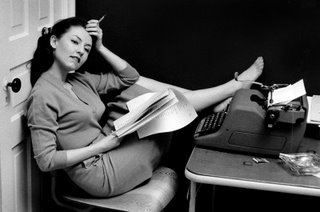
trying to write the next Peyton Place
Ella Fitzgerald, Azure.
Cecil Taylor, Azure.
Duke Ellington's "Azure," which he composed and recorded in 1937, has one of Ellington's loveliest, most yearning melodies--built around the graceful movement of semi-tones, rising and falling gently, saturated with melancholy and wistfulness.
Ten days apart in September 1956, two musicians--Ella Fitzgerald, in the midst of consolidating her reputation as the premier vocal interpreter of jazz standards, and the young Cecil Taylor, in his first-ever recording date--each recorded a version of "Azure." Both are masterpieces, though unlike in a great many ways.
Fitzgerald's version, which she recorded as part of her "Duke Ellington Songbook" sessions, is impeccably sung--it might be my favorite Fitzgerald vocal. Incredibly phrased, Ella's vocal imbues each word with longing, mystery and regret.
Throughout her "Songbook" recordings of the mid-to-late 1950s (Fitzgerald recorded Gershwin, Porter, Berlin, Mercer, Rodgers/Hart, Arlen and Kern as well), there is the sense of utter mastery, and, in a way, of finality. It's the absolute transformation of jazz and Broadway pop tunes, once considered disposable trash, into art--the standardization of standards. And you might argue that Fitzgerald's feat ultimately stifled jazz--by creating a canon of impossibly-well-sung versions of the standards, there is little room for improvement, of truly new interpretations.
But as Ellington himself once said, "No music ever ends." Cecil Taylor shows one way out. For his first record, Jazz Advance, Taylor paid homage to Ellington and Thelonious Monk, two of his primary inspriations, taking some of their time-worn standards and converting them into brand-new currency.
Taylor came out of the classical music world--the son of highly-educated parents, Taylor had begun playing piano by five. Attending the Boston Conservatory in the early 1950s, Taylor studied Stravinsky and Schoenberg, but also began honing a taste for jazz. By 1956, he had assembled a group and began recording.
In his version of "Azure," Taylor manages to retain Ellington's sense of mood throughout a run of at-times wild variations on the melody. Throughout his solos, Taylor offers a compendium of playing styles: sometimes he goes at white-hot speed, drumming dense chords into being; other times, he is spartan and placid. But throughout, there's a great sense of feeling, a respect for Ellington's composition, imbued with what Nat Hentoff called Taylor's "tough, sinewy intelligence."
Recorded in Boston on September 14, 1956 by the Cecil Taylor Unit: Taylor (p), Steve Lacy (soprano sax), Buell Neidlinger (b) and Denis Charles (d). Find on Jazz Advance.
Fitzgerald's take, recorded in Hollywood on September 4, 1956, featured Duke himself on accompaniment, along with an top-flight session group, including Ben Webster on tenor sax, Oscar Peterson (p), Stuff Smith (v), Barney Kessel and Herb Ellis (guitars), Joe Mondragon (b) and Alvin Stoller (d). On Day Dreams.
And Ellington's original (which he co-wrote with Irving Mills) was recorded on May 14, 1937 (there are two more takes from April '37 as well), and can be found on Masterpieces.
Jane Jacobs, 1916-2006.
Farewell, and thanks, among so many things, for helping to save Soho and the West Village. Raise a glass to her tonight, especially those of you sitting in a Village bar that, had it not been for Jacobs, would now be buried under some stretch of a gruesome Lower-Manhattan Expressway.
"What was getting immediately under my skin was this mad spree of deceptions and vandalism and waste that was called urban renewal. And the way it had been adopted like a fad and people were so mindless about it and so dishonest about what was being done. That’s what ticked me off, because I was working for an architectural magazine and I saw all this first hand and I saw how the most awful things were being excused..."
No comments:
Post a Comment